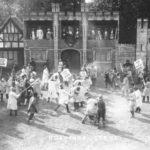 In the May 1837 bye-election, the Tory candidate, Henry Broadwood, won by 279 to 221. Such was the national interest in this bye-election that the editor of the London Times chartered 15 relay horses, one at each end of a ten-mile stretch on the road to London. On the stroke of 4 o’clock, the poll was closed and the result was handed to the first rider who was bedecked in ribbon, as was his horse. The crowd opened and they galloped away in a cloud of dust, heading for the Piper’s Inn, where the next horse waited. The following day, the London Times published the results. But there was more news to come. The Liberals objected and proved that at least 153 votes had been paid for! The case was proven, the Tory de-seated, and the Liberal Richard Sheridan returned to Parliament. Unfortunately William lV died before Sheridan could take his seat and that meant a general election was required.
In the May 1837 bye-election, the Tory candidate, Henry Broadwood, won by 279 to 221. Such was the national interest in this bye-election that the editor of the London Times chartered 15 relay horses, one at each end of a ten-mile stretch on the road to London. On the stroke of 4 o’clock, the poll was closed and the result was handed to the first rider who was bedecked in ribbon, as was his horse. The crowd opened and they galloped away in a cloud of dust, heading for the Piper’s Inn, where the next horse waited. The following day, the London Times published the results. But there was more news to come. The Liberals objected and proved that at least 153 votes had been paid for! The case was proven, the Tory de-seated, and the Liberal Richard Sheridan returned to Parliament. Unfortunately William lV died before Sheridan could take his seat and that meant a general election was required.
Corruption surfaced again in 1865 when Henry Westropp, Tory, topped the poll and was proven to have paid for votes. Three years later, the two Liberal candidates just pipped the two Tories, and they were proved to have paid for votes. In 1869, a Royal Commission was called for to establish how bad the problem was. After 47 days of enquiry, during which they investigated the previous 5 elections, they produced a report with 1,174 pages detailing 47,548 questions and answers. They concluded – it was bad – seriously bad. They found evidence of corruption for at least the previous 40 years, and evidence that if a person was found to be incorruptible where bribes were concerned, the common practice was to get that voter too drunk to vote. Corruption was so rife that there was no hope of ever running a fair election in the town. Their opinion was that it would take at least two generations before a fair election could be held, and only then if the town was disenfranchised in the meantime. And so it was. The town was deprived of the right to return an MP.
Text Copyright © 2008 Roger Evans

